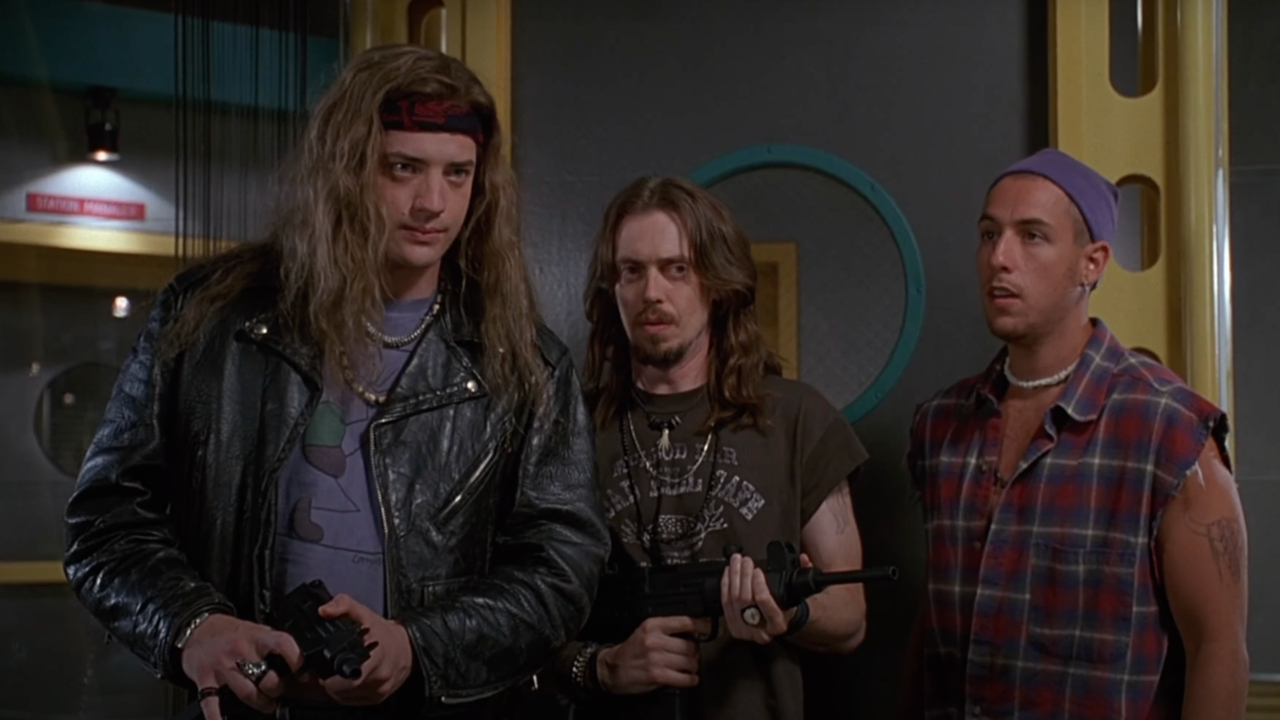A love letter to Airheads: one of the great metal cult classics of the 90s
Michael Lehmann's 1994 comedy Airheads bombed on release, but has since been embraced by metalheads the world over

Select the newsletters you’d like to receive. Then, add your email to sign up.
You are now subscribed
Your newsletter sign-up was successful
Want to add more newsletters?
Let’s be clear — metalheads, generally, couldn't care less about being understood or embraced by the mainstream. Quite the opposite: we tend to celebrate our outsider status with loud, boisterous defiance and we cast withering scepticism upon any mainstream attempts to depict metal culture. Which is why 1994’s Airheads proved to be such a wonderful surprise. The story of a hapless but deeply-committed metal band who hijack their local radio station emerged as a clever and authentically funny outing that delighted metal fans the world over, launched acting careers and overcame a dismal box office run only to emerge as one of the great cult classics of the 90s.
Heavily-inspired by Dog Day Afternoon — 1975’s award-winning hostage film starring Al Pacino — Airheads told the story of a power trio known as the Lone Rangers, who sneak into the local rock radio station in a bid to get their demo played on the air. Through a spiralling deluge of events, the band (Brendan Fraser as Chazz, the guitarist and vocalist, Steve Buscemi as bassist Rex and Adam Sandler as drummer Pip), turn the situation into a high-tension hostage crisis, complete with SWAT team (including Chris Farley and Ernie Hudson), a burnt-out rebel DJ (Joe Mantegna), a beleaguered girlfriend (Amy Locane) and even a character crawling around in the air vents à la Die Hard (Seinfeld’s Michael Richards). Each attempt to play the demo tape fails in progressively more spectacular ways. Side plots and oily villains are introduced and, without ruining it for the uninitiated, the film reaches a suitably over-the-top, yet happy ending. Cameos by Motörhead legend Lemmy (as the “School Newspaper Rocker”) and Rob Zombie added extra metal bona fides to the final cut, too.
The casting net was thrown wide across Hollywood, with the likes of John Cusack, Bill Murray, Winona Ryder, Chris Rock and Malcolm McDowell all bandied about for roles. In a comprehensive oral history of Airheads for Consequence, director Michael Lehmann states that Kevin Spacey — then viewed primarily as a theatre actor — told him, “You’d be crazy not to cast me.” Ultimately they settled on an up-and-coming leading man in Brendan Fraser for Chazz. Steve Buscemi, then known primarily for his work in edgy indie films, was cast as Rex and after some debate, Sandler was cast as Pip, though in 1994 he was viewed as an unproven box office commodity with a questionable sense of humour. The combination proved inspired; the actors were not only convincing in their roles but the leading actors would later rate the filming experience among their favourites.
The timing of Airheads’ release is critical to understanding its brilliance; by 1994, the eruption of grunge had reduced perceptions of heavy metal to comedic punchlines and dim-witted stereotypes. Consequently, releasing a movie where the leading characters were metalheads was a dicey proposition. From a marketing perspective, 20th Century Fox needed to find a way to essentially promote a commercial film based on a culture that the mainstream viewed as either irrelevant or at the very least, unfashionable. Also, there existed some uncertainty as to whether the movie was a dark satire or a slapstick comedy. If the film proved too saccharine and formulaic, it would lose the youthful, clever audience that it sought to attract. As it was, the studio nixed the idea of Sandler’s character sporting a neck tattoo, viewing it as far too radical a statement for a country that viewed Bruce Springsteen’s Born In The USA as the new spearhead of rock rebellion.
Most importantly, Lehmann needed to strike the right balance between crafting a raucous comedy without making a mockery of the characters or their music, which would have felt both cheap and mean-spirited. Ultimately, even as the band stumble through more and more devastating missteps, we root for them because of their pure intentions and their hopelessly-naive optimism. There’s a childlike innocence radiating through their irrepressible desire to simply play their song for people. Ultimately, Lehmann and the cast hit just the right notes, releasing a smart and irreverent comedy that neatly avoids ever feeling too cynical or not cynical enough.
Early box office returns were grim. In fact, Airheads was pulled from the theatres after just two weeks, during which it earned a paltry $5 million — less than half of its $11 million budget. It was only in the years following, when networks like Comedy Central pushed the film into heavy rotation, that Airheads found its audience, eventually attaining the cult status that it enjoys today. The ultimate validation is that, like Spinal Tap, the movie continues to thrive through the years even as trends, attitudes and values dramatically change. Airheads endures because it taps into more than just a spirit of defiance; it tells a creative and well-crafted story about a group of people who are likeable, passionate, flawed and resolutely optimistic. All hail the Lone Rangers.
Sign up below to get the latest from Metal Hammer, plus exclusive special offers, direct to your inbox!
Hailing from San Diego, California, Joe Daly is an award-winning music journalist with over thirty years experience. Since 2010, Joe has been a regular contributor for Metal Hammer, penning cover features, news stories, album reviews and other content. Joe also writes for Classic Rock, Bass Player, Men’s Health and Outburn magazines. He has served as Music Editor for several online outlets and he has been a contributor for SPIN, the BBC and a frequent guest on several podcasts. When he’s not serenading his neighbours with black metal, Joe enjoys playing hockey, beating on his bass and fawning over his dogs.

